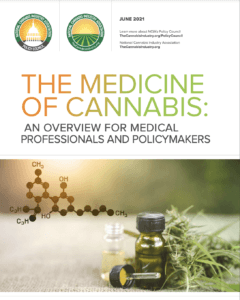Vireo’s Dr. Paloma and Dr. Stephen Publish White Paper on “The Medicine of Cannabis”
Vireo’s own Dr. Paloma Lehfeldt, MD, Director of Medical Education, and Dr. Stephen Dahmer, MD, Chief Medical Officer, have published a white paper on the Medicine of Cannabis, along with four other doctors, providing information for policy makers and medical professionals about the science, history and uses of medical cannabis.

The white paper discusses the history of cannabis prohibition, and its current legal environment. While legal uses and restrictions vary from state to state – some states allow medicinal use for different medical conditions than others, while some states allow adult use, and others prohibit all uses – the U.S. federal government still classifies cannabis as a Schedule I Controlled Substance. Because it is still classified as an illegal drug at the federal level, scientists and doctors in the United States face much greater restrictions on research efforts than do scientists and doctors in parts of Europe and Israel.
These restrictions mean medical professionals in the United States don’t have as much research-based information at their disposal when making recommendations to patients who could benefit from the medicinal benefits of cannabis, and cannabis professionals and users do not have as much data or guidance when making decisions about which products to use and in what amounts.

The white paper takes an in-depth look at these legal restrictions and their impact and makes recommendations for policy changes that could make it easier for scientists and medical providers to study cannabis’ effects and gather scientifically based data, which in turn could help cannabis patients and consumers as well as the industry.
The Cannabis Administration and Opportunity Act, introduced in Congress earlier this month, would be a step in this direction. The bill calls for cannabis to be removed from the federal list of controlled substances and would move regulatory authority away from the Drug Enforcement Administration (DEA) and to the Food and Drug Administration (FDA), the Bureau of Alcohol, Tobacco, Firearms and Explosives (ATF) and the Alcohol and Tobacco Tax and Trade Bureau (TTB), with the FDA being the primary regulatory authority for manufacturing, marketing and product standards.
Those changes would make it easier for scientists and medical professionals to study the effects of cannabis and gather solid data without fear of repercussions, in turn making it easier for patients and consumers seeking consistent product experiences and for medical professionals trying to give advice about cannabis. Equally important, the Cannabis Administration and Opportunity Act would take steps to begin to right the historically disproportionate enforcement measures surrounding cannabis and their associated effects, from expediting expungements of cannabis-associated criminal charges to helping fund grants and small business loans rooted in social equity.
To read more about the recommendations for policy changes made in the white paper, and why they are so important, you can download the full white paper report at no cost. You can also listen to Dr. Lehfeldt talk about the paper and its findings in an episode of the National Cannabis Industry Association (NCIA)’s Cannabis Industry Voice Podcast.
The six primary authors of the white paper will also speak about their findings at a webinar hosted by the NCIA on Tuesday, July 20 at 3 p.m. ET. The webinar can also be viewed at no cost, though pre-registration is required.

